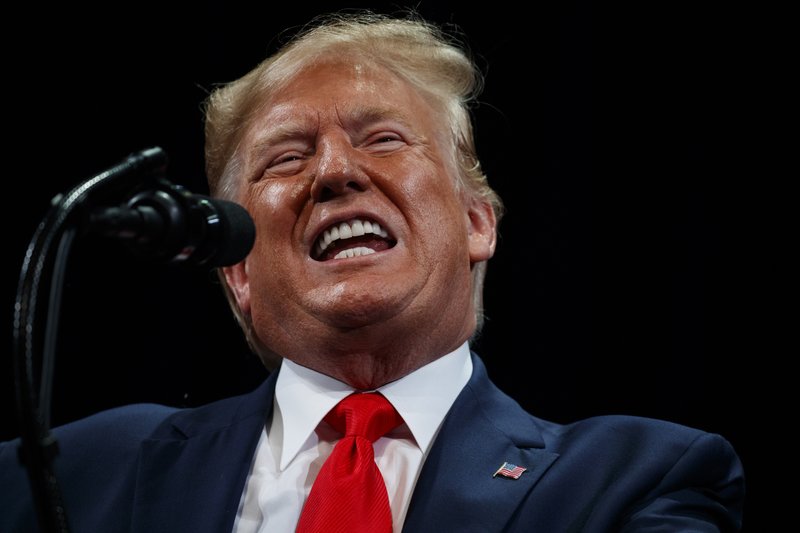President Donald Trump unveiled a new executive order Thursday afternoon that calls for expanding the benefits offered by private Medicare plans, framing the decision as the responsible alternative to the "Medicare for All" policies supported by some of his Democratic political opponents.
"Medicare is under threat like never before," Trump said in a speech at the country's largest retirement community, known as The Villages, in Florida. "Almost every major Democrat in Washington has backed a massive government health care takeover that would totally obliterate Medicare."
The executive order seeks to beef up Medicare Advantage, the plans offered by private insurers that contract with Medicare, which currently cover about a third of the program's 60 million beneficiaries, according to senior administration officials. The order also calls for lowering premiums in Medicare Advantage, allowing providers to spend more time with patients and reducing Medicare fraud.
The White House made details of the executive order public after Trump's speech. The changes it directs the Health and Human Services Department to carry out are intended, in part, to guarantee that Medicare Advantage plans are on equal footing with the original version when people join the program, and permit the private plans to offer a greater array of health-related services, such as adult day care. They also will foster long-distance "Telehealth" services that may be especially useful in rural areas.
[Video not showing up above? Click here to watch » https://www.youtube.com/watch?v=X1ZGZP4sOAA]
And they aim to remove a variety of regulations, ranging from billing rules to allowing health care workers who are not doctors, such as nurse practitioners, to treat patients and get paid at higher rates. Another facet would allow patients in Medicare Advantage plans easier access to creating medical savings accounts.
The executive order is the fifth relating to health care that Trump has issued since taking office and the third in just over three months. None of the changes envisioned in Thursday's order will occur immediately since all require a period of study by health officials and a rewriting of federal rules.
"With every ounce of strength and every bit of soul, we are going to protect Medicare for you," Trump vowed.
In his speech, Trump also reminded his audience that the administration has been developing rules that would enable states to obtain federal permission to import certain drugs from Canada and other countries where pharmaceuticals are sold for lower prices. Florida is the first state that has formally requested such permission, but the federal rules are a work in progress.
Senior citizens "like what they have, so the president is going to protect it," Alex Azar, the secretary of health and human services, said in a conference call with reporters before Trump's afternoon speech.
"This president has been focusing on health issues that many administrations have ignored for decades," Joe Grogan, the director of the White House Domestic Policy Council, said in the conference call.
The executive order, originally called "Protecting Medicare From Socialist Destruction," was renamed "Protecting and Improving Medicare for Our Nation's Seniors" before Trump's speech. But administration officials called the renaming a distinction without a difference.
Grogan said that the goal was to contrast what he said was the administration's commitment to protecting senior citizens with "the vision for Medicare as a one-size-fits-all, single-payer system" supported by many Democratic candidates. He said the plan offered by Democrats would destroy health benefits for older adults who had paid into this program for their entire lives.
"Medicare for All is Medicare for none," added Seema Verma, administrator of the Centers for Medicare and Medicaid Services, who has been a vocal critic not just of the Democrats' proposals, but also of the Patient Protection and Affordable Care Act. "Proposals like Medicare for All, as well as the public option, they are morally wrong because they would demote American seniors to second-class status."
Democrats competing for their party's nomination for president strongly disagree: All advocate expanding health care coverage, though their strategies to do so vary.
Much of the debate has centered on Sen. Bernie Sanders' Medicare for All plan, which would cover everyone under a government-run plan and eliminate most private insurance. Trump said electing a Democrat would jeopardize older Americans' access to health care.
Sanders says his plan would lower costs and provide new benefits, including coverage for long-term care. Medicare is the government's flagship health care program.
The executive order does not involve a major overhaul of Medicare, which would require congressional approval.
So far the debate about Medicare for All has mainly been about its projected costs to the government, estimated at $30 trillion to $40 trillion over 10 years.
The Sanders plan would eliminate most private health insurance, including the Medicare Advantage option. Sanders, who unexpectedly underwent a heart procedure this week, says Medicare for All would nonetheless offer senior citizen broader benefits and lower costs.
Sanders' style of single-payer health care has long been popular among liberals. But recent polling has shown that a majority of Democrats and independents who lean Democratic prefer expanding coverage by building on the Affordable Care Act. Trump is asking federal courts to overturn that law as unconstitutional.
While Trump largely kept his remarks in Florida focused on health care, he veered to attack Democrats on immigration, tax policy and their treatment of Supreme Court Justice Brett Kavanaugh.
He also briefly talked about House Democrats' impeachment investigation. "That's why they do the impeachment crap, because they know they can't beat us fairly," he said. "If they won, it would be a sad, sad day for our country."
Information for this article was contributed by Annie Karni of The New York Times; by Toluse Olorunnipa and Amy Goldstein of The Washington Post; and by Kevin Freking, Ricardo Alonso-Zaldivar and Deb Riechmann of The Associated Press.
A Section on 10/04/2019
